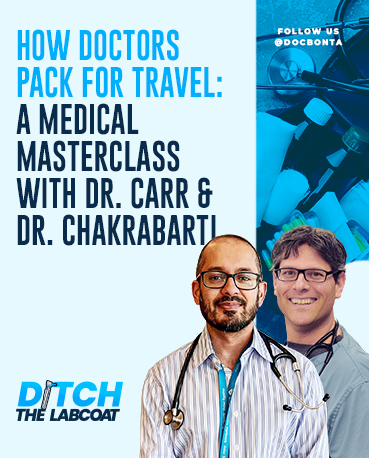The Realities of Travel Medicine
Most of us think about packing the essentials—passport, phone charger, and enough clothes to avoid emergency underwear shopping. But what about medical essentials? What do actual ER doctors and infectious disease specialists take with them when they travel? And when that “Is there a doctor on board?” call happens mid-flight, who actually gets up?
In a recent lively, laugh-filled discussion, I sat down with Dr. David Carr (Emergency Medicine), Dr. Sumon Chakrabarti (Infectious Diseases), and myself, an Internal Medicine specialist. The goal? To break down travel medicine into what you really need to know. What followed was a wild ride of personal travel mishaps, must-have medications, and the terrifying reality of medical care in some destinations.
https://www.linkedin.com/in/sumon-chakrabarti-692a5b29/?originalSubdomain=ca
Packing a Medical Kit Like a Pro (or Not?)
While some of us (including me) travel with blind faith in our credit card’s travel insurance, David Carr takes things to the next level. He never buys travel insurance (he relies on his Amex), but his travel kit is essentially a portable ER.
His essentials?
- Ondansetron (Zofran): For nausea and vomiting—because no one wants to be the person throwing up in an airplane seat.
- Isopropyl Alcohol Wipes: A surprising but effective anti-nausea hack.
- Dermabond (Tissue Glue): If it can hold skin together in an ER, it can handle a busted nail in Nashville (which it did on his latest trip).
- Tetracaine Eye Drops: Because no one wants to spend a vacation dealing with a scratched cornea.
- Rhino Rocket: For nosebleeds. Not essential for most people, but we’re talking about an ER doc who has probably seen some horror stories.
Sumon, the infectious diseases guru, takes a more strategic approach, focusing on preventing infections in the first place.
His must-haves?
- Pepto-Bismol: The unsung hero of travel diarrhea—but don’t take it for more than two weeks unless you want tinnitus and black poop.
- Azithromycin (Z-Pak): The go-to antibiotic for traveler’s diarrhea.
- Clavulin (Amoxicillin-Clavulanate): Better than Keflex for soft tissue infections, especially if you’re swimming or diving.
- Malaria Prophylaxis (Malarone): Because mosquitoes don’t care that you’re on vacation.
What’s the one thing neither of them bother bringing? Suture kits. Because if you need stitches, you probably need freezing too—and who’s carrying lidocaine and sterile instruments? Stick to glue or bandages and let a professional handle it.
The “Doctor on Board” Dilemma
We’ve all heard it. The dreaded airplane announcement:
“Is there a doctor on board?”
https://www.youtube.com/watch?v=BN3K_ZFEOgM
What do doctors actually do?
David admits he doesn’t rush in unless it’s a second call (especially if he’s in a nice seat). But if it’s serious, he steps up. In fact, he once treated a patient with rapid A-fib and pulmonary edema mid-flight, spraying nitroglycerin like it was Febreze and keeping her stable until they landed in Greenland.
The general take? Most airplane medical kits are basic, but they have what really matters:
✔ A defibrillator
✔ EpiPen (critical for anaphylaxis)
✔ Basic meds like antiemetics
Pro tip? Airlines have medical directors on the ground to guide you through complex decisions, so you don’t have to solo a mid-air code blue.
What About Diarrhea? (And Why Imodium Can Backfire)
Here’s the thing: Traveler’s diarrhea is inevitable, but how you treat it matters.
David and Sumon agree:
✔ Azithromycin is king—Ciprofloxacin has too much resistance.
✔ Pepto-Bismol can prevent it—if you’re willing to take four doses a day (but who is?).
✔ Imodium is only for emergencies—like being stuck on a long bus ride. Otherwise, it slows down motility and can lead to severe constipation or even “paradoxical diarrhea” later.
David’s take? “Imodium is great if you’re in a hot tub and don’t want to ruin the vibe. Otherwise, let nature run its course.”
Sumon backs it up, adding that delayed constipation from Imodium is something he and David both see in the ER all the time.
https://www.youtube.com/watch?v=uD5CkxawG_0
Vaccinations: What’s Necessary vs. Overkill?
So, do you need Dukoral for traveler’s diarrhea?
Nope. Sumon called it an “expensive Tic Tac” (shoutout to ID legend Isaac Bogoch for coining that phrase).
https://discover.research.utoronto.ca/19189-isaac-bogoch
Here’s what actually matters:
✔ Hepatitis A & B – If you don’t have these, fix that before traveling.
✔ Typhoid – If you’re going to India, Southeast Asia, or South America, get either the injectable (every 3 years) or oral version (every 5 years).
✔ Yellow Fever – If your trip involves Brazil, Peru, or Africa, you’ll need it—and proof of vaccination might be required for entry.
✔ Malaria Prophylaxis – If you’re traveling to a high-risk zone, take Malarone. Skipping it because “locals don’t take it” is a rookie mistake.
David and Sumon agree that rabies vaccines are situational—but if you’re bike touring through India, they’re worth considering.
Medical Emergencies Abroad: What You Need to Know
✔ Insurance matters. If you need evacuation, it’s going to cost you.
✔ Google reviews for hospitals are a joke—but calling a trusted friend or checking academic hospital affiliations is key.
✔ If you’re more than 30 minutes from a hospital, consider bringing an EpiPen.
✔ Older travelers should rethink certain destinations. If you’re 80, maybe skip your first trip to remote India.
Sumon’s final take? The game doesn’t end when you land home. If you return from travel with a fever and no clear cause, get checked out ASAP. Malaria, dengue, and other tropical infections don’t care that you made it back to Canada.
Final Thoughts: Pack Smart, Travel Safe, and Avoid Senior Frogs
As this hilarious, insightful conversation wrapped up, one final takeaway emerged:
Travel medicine isn’t about being paranoid—it’s about being prepared. Whether it’s packing the right meds, avoiding unnecessary antibiotics, or knowing when to seek help, a little knowledge goes a long way.
Massive thanks to Dr. David Carr and Dr. Sumon Chakrabarti for this fast-paced, knowledge-packed chat. If nothing else, we now know that:
✔ Dermabond can fix anything
✔ Dukoral is a scam
✔ Imodium has a dark side
✔ Travel insurance is worth the money
✔ For Grad Trips? No pills. No powders. Just say no.
Happy (and safe) travels! ✈️






